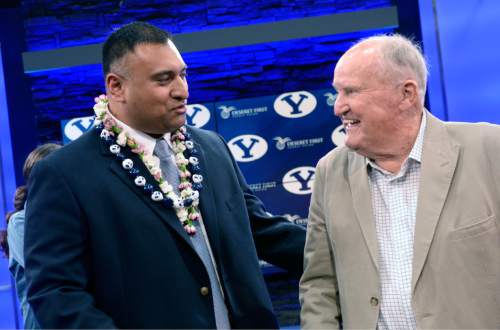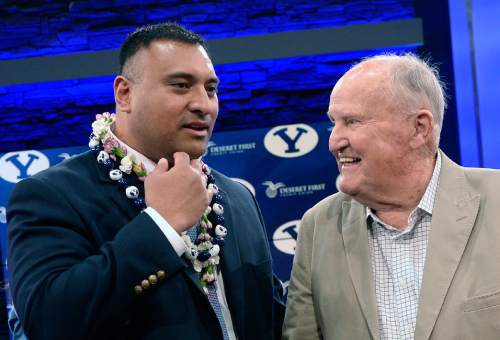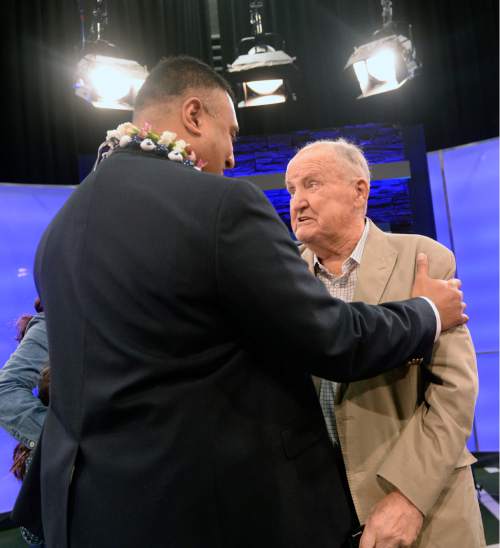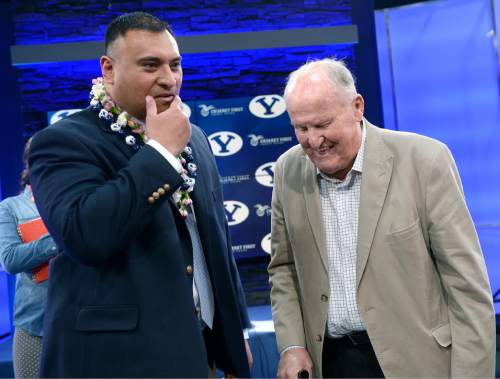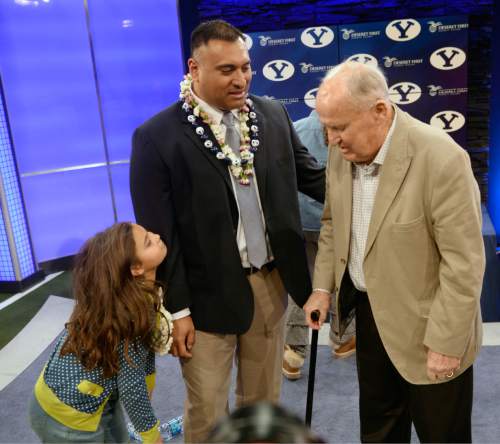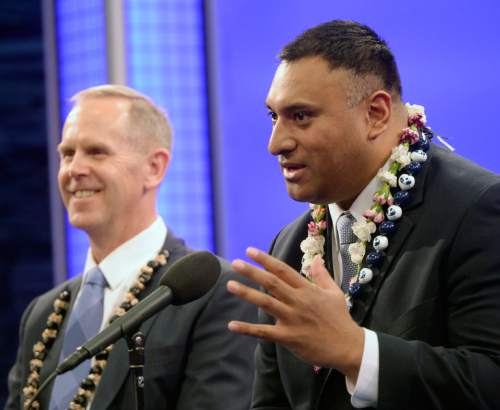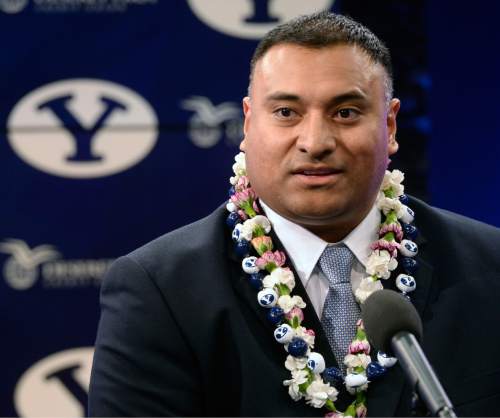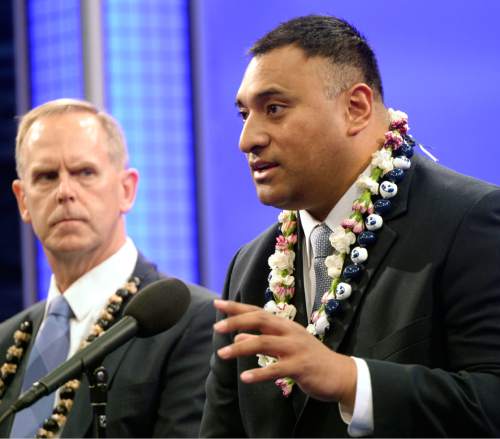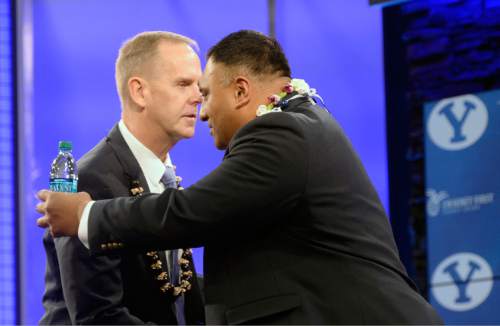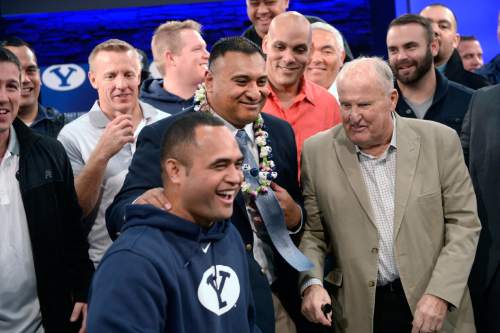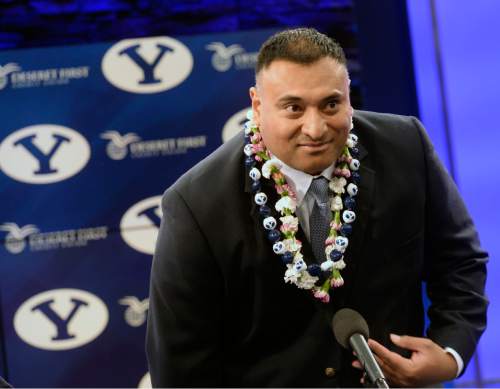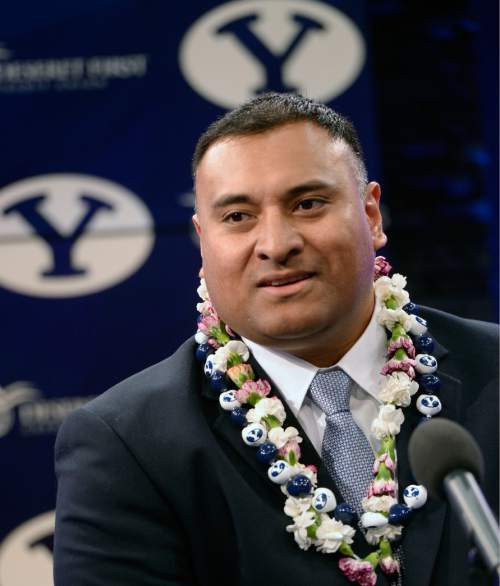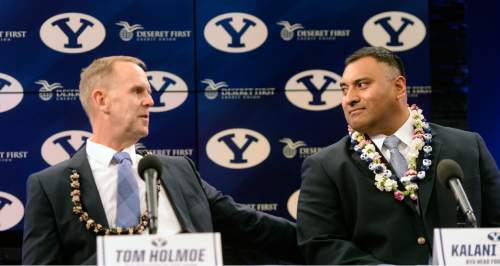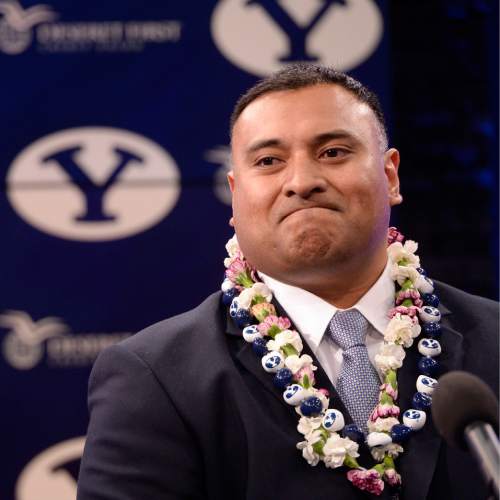This is an archived article that was published on sltrib.com in 2015, and information in the article may be outdated. It is provided only for personal research purposes and may not be reprinted.
Provo • Reno Mahe can't describe what it is, how it went missing or why it stayed missing, but Monday at BYU's Broadcasting Building, he was sure it was back.
"I'm lost for words, and typically, I can talk your ear off," Mahe laughed, one of dozens of former players and family to welcome Kalani Sitake as BYU's newest head football coach at his introductory news conference.
Time and again, Sitake's eyes lit up as they scanned the room. There were hugs. There was clapping. It resembled, as much as anything, a reunion.
"I've never left," the first-time head coach told reporters. "I've always been a part of BYU. I've always bled blue."
Sitake spent last season as defensive coordinator at Oregon State and is known to many locally as an assistant and defensive coordinator under coach Kyle Whittingham at Utah.
But he was, first, a childhood BYU fanatic, then a fullback who was named a team captain during LaVell Edwards' final season as head coach in 2000.
Asked how he would sell recruits on the experience of playing in Provo, he was at his most animated.
"It's a special place, it's unique, and good things can happen for you if you come to this school," Sitake said. "So, recruits, get ready, because I'm living proof. I'm going to look you in the eyes. I played here. I lived this life. I met my beautiful wife here. I made great friends, brothers for life here. And so, this is a great place for you if you want to be part of that."
Edwards was in attendance Monday, telling reporters that Sitake's name was one of the first to spring to mind when Mendenhall accepted an offer from Virginia. Sitake consulted Edwards during the two-week hiring process and said Monday that he plans to "lean heavily" on his old coach for guidance.
Mahe doesn't blame Mendenhall for what he sees as a disconnect between the Edwards era and the current BYU program, but Sitake's hiring instantly bridged the gap, he said. Sitake is likewise thought to tie BYU more closely to the Polynesian community, as the nation's first head coach of Tongan descent. Mahe said the importance of that is hard to overstate.
"It's huge for the kids to see that no matter the barriers that are placed before us, that you can achieve these kind of dreams," Mahe said. "... We're just excited for him to be that trailblazer and that example for the rest of us."
The Polynesian Football Hall of Fame estimates there are more tnan 60 NFL players of Polynesian ancestry, but few have risen to head coaching positions.
Navy's Ken Niumatalolo, whom BYU also pursued, is of American Samoan heritage.
Sitake wore a lei to the news conference, as did BYU Athletic Director Tom Holmoe.
His heritage is important, Sitake said, but he said he's also proud to be a Mormon with high character and coaching skills gleaned from the likes of Oregon State head coach Gary Andersen and Whittingham.
"I just happen to be Tongan, which I'm really proud of as well," he said. "It's important to me, but it's just part of who I am."
All-Poly football camp founder and Alta High coach Alema Te'o believes Sitake's example may increase participation in American football in Tonga and American Samoa. As a recruiter, Te'o said, Sitake has already gained the trust of the Polynesian community in the United States, he said.
"Polynesian people go with who they trust," Te'o said. "... I've seen kids have offers to different schools, but parents say 'Hey, you go over here.' The Polynesian kids will listen to their parents."
Sitake is also one of the youngest FBS coaches, a fact he was amused to be asked about. He thought he'd become old when he turned 40 this year, he said, quipping, "It's great to be young again."
Sitake said he began imagining himself as BYU's coach as an armchair-quarterbacking 8-year-old, wondering why Lakei Heimuli and Vai Sikahema didn't get more touches, or why Leon White didn't blitz more.
"He's not alone there," said Edwards, BYU's coach since before Sitake was born to his final season as a player. "I've had brothers and sisters do that."
Holmoe said age wasn't a factor in the decision, and he credited Sitake for beyond-his-years humility. He opened by telling reporters that when Sitake walked into the building Monday, he encountered a few people "that were, I think, just kinda trying to stay warm."
Sitake approached them, put his arm around them and introduced himself.
"I'm Kalani," Holmoe recalls him saying. "It's not Coach Sitake, it's Kalani."
"Those people looked up at him like, 'I don't know who that guy is, but I like him,' " Holmoe laughed. "And I do, too."
Sitake was more shy about BYU's five straight losses to Utah — mocking a popular cliche with the line, "That's the second game [in 2016], so I'm not really focused on that game" — and his offensive strategy — balanced, with the ambition "not to punt as much."
Defensively, he said, he plans to be aggressive. "We need to establish the line of scrimmage, and we need to own the trenches."
Sitake said he hopes to hire assistants to join his recruiting efforts as soon as possible. Holmoe said Sitake is "already pulling on my sleeve" about increasing pay for assistants, and acknowledged some degree of agreement.
Twitter: @matthew_piper —
About Kalani Sitake
Born • Nuku'alofa, Tonga
Hometown • Laie, Hawaii, and Provo
Playing experience • BYU fullback, 1994 and 1997-2000; signed with Cincinnati Bengals in 2001 and was forced to retire due to back injury.
Coaching experience • 2015, Oregon State defensive coordinator; 2009-14, Utah defensive coordinator; 2005-08 Utah linebackers; 2004, Southern Utah offensive line/tight ends; 2003, Southern Utah running backs/tight ends; 2002, BYU graduate assistant; 2001, Eastern Arizona defensive backs/special teams


